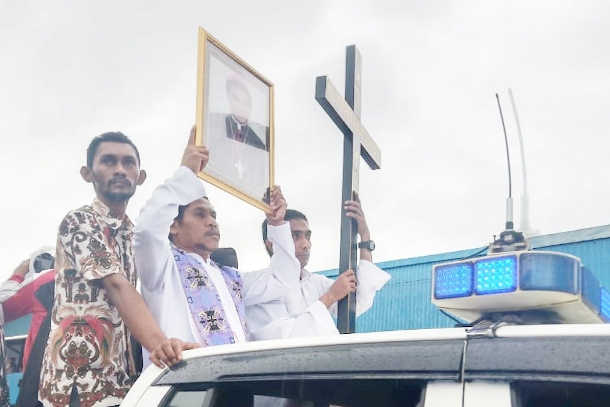
Catholics join a funeral procession in Timika in Papua to bury Bishop John Philip Saklil on Aug. 7. (Photo by Kristin Mirip)
Many Catholics in Papua believe the recent deaths of several indigenous priests and a bishop were not due to illness but the result of a conspiracy to end their fight for the rights of local people.
Though this is hard to prove, such suspicion can only be dispelled through an independent investigation, and only the Vatican — not an Indonesian civil authority — is trustworthy enough, they say.
As such, calls for the Vatican to intervene and form a fact-finding team are being made in Papua to investigate the “mysterious deaths” of Bishop John Philip Saklil of Timika as well as Fathers Neles Tebay, Yulianus Mote, Jack Mote, Michael Tekege and Nato Gobay.
Bishop Saklil died in hospital on Aug. 2, soon after collapsing as he was about to have lunch. A priest later said the prelate had suffered from diabetes.
Two days later, Father Yulianus Mote, 51, the head of a Jayapura diocesan tribunal and lecturer at the Fajar Timur School of Philosophy in Jayapura, died in a Jakarta hospital where he was being treated after collapsing at an airport in Papua.
Before his death, the priest had toured several parishes in Jayapura Diocese, inviting native Papuans to reconcile and support peace.
Father Mote believed peace in Papua, which has seen a low-level insurgency against Indonesian rule since the 1960s, could be achieved through continuous dialogue with Jakarta.
In the other cases, Father Tekege was chairman of the catechetical college in Timika Diocese, while Fathers Gobay and Jack Mote were parish priests in the same diocese. They were also outspoken about rights abuses and injustice in Papua and the cause of their deaths is unknown.
Meanwhile, Father Tebay, chairman of the Fajar Timur School of Philosophy and coordinator of the Papua Peace Network, died in Jakarta of blood cancer in April.
However, Markus Haluk, a Papuan Catholic youth leader, said many Papuans believe all the priests and the bishop died unnatural deaths and hospitals had only revealed “what had happened, not how they happened.”
Fighting to end violence
He said people’s suspicions are not without reason. All the dead churchmen were outspoken and unceasingly fought for the rights of Papuan people.
“All were human rights defenders,” said Haluk, adding that questioning their deaths made sense because fighting to end violence in the restive region is a dangerous business.
He pointed to Father Tebay, who he said died while fighting to end the conflict in Papua through a Jakarta-Papua dialogue. He fought through writings and lobbying the Jakarta government through the organization he co-founded in 2009 — the Papuan Peace Network, Haluk said.
Many Papuans do not believe Father Tebay died of blood cancer. Instead, they think someone caused his death, he said.
It started some time ago when he “fell” from a motorcycle during a peace mission in Jakarta. Since then, his health deteriorated and he finally died in St. Carolus Hospital in Jakarta. “He was a healthy man,” Haluk claimed.
Similarly, Bishop Saklil died after initiating the Tungku Api or Fireplace campaign to encourage indigenous people to protect their forests and land and not sell it.
A month before he died, the bishop protested against the planned withdrawal of teachers from private schools in Mimika Regency. He strongly opposed this because the schools are mostly located where indigenous Papuans live, Hakul said.
“The people here [in Papua] are suspicious about his death. They believe it was engineered by people who do not want peace in Papua,” he said. “It might be hard to prove but things could be clearer if investigated.”
Soleman Itlay, a member of the Indonesian Catholic Student Association, said the recent deaths followed a similar pattern — the clergy collapsed while on a mission to end violence in Papua.
It is clear that members of the Catholic Church hierarchy who openly speak against injustice in Papua are being targeted, he said.
“The deaths of priests and bishops cannot be seen as ordinary. Their deaths are not normal and appear to be related to their struggle for oppressed Papuans,” he said.
Itlay called on the Vatican to intervene and investigate their deaths. “These events have shaken the foundation of the Catholic Church in Papua and if not addressed properly it can cause divisions among church people in Papua,” he said.
Ambrosi Muliat, another young leader, said the universal Catholic Church must focus its attention on Papua and “hear the cry of the suffering people of God.”
He called for Pope Francis to immediately form a fact-finding team to investigate the cases. The formation of this team, he said, would be important in dispelling various concerns and settling disputes that have resulted lately among the faithful in Papua.
"If nothing is done, the anxiety and suspicion about the deaths of the priests could damage relationships between religious believers," he said.


